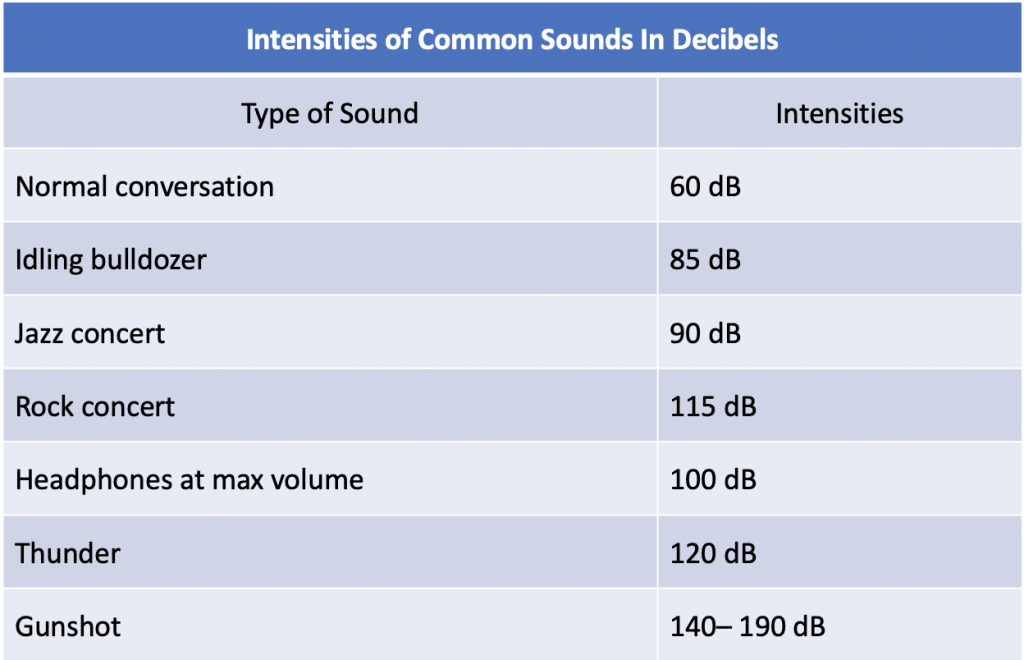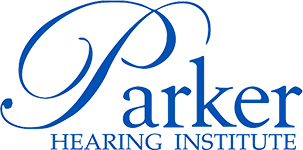Hearing Loss Prevention
Your environment affects your hearing health. The most notable cause of hearing loss is loud sounds. Sound is measured in decibels (dB). Most sounds above 85 dB can cause permanent hearing loss. People cannot always control the volume of their environments, but they can control how they respond to it. When talking about hearing health, the quieter the noise the longer the duration before hearing loss occurs. Below is a list of the decibel level of some common sounds.

The most important concept to remember: the length of exposure to loud noises does the most harm to your hearing. The longer the exposure to loud noise, the more harm to your hearing. While a short loud bang is bad for your ears, imagine how bad it would be if that noise was constant? If you would like to learn more about how you hear, please visit our How You Hear page.
Occupational Noise and Hearing Protection
Hearing health is a serious issue. Nearly 22 million workers are exposed to noise loud enough to induce hearing loss according to the Center for Disease Control (CDC). Despite the many hazards that some jobs face, occupational hearing loss is preventable.
There are laws that protect workers from damaging noise at the workplace. The CDC estimates that nearly $242 million is spent per year on hearing loss for worker’s compensation. Both the National Institute for Occupational Safety and Health (NIOSH) and the Occupational Safety and Health Administration (OSHA) are well established national programs that will aid and regulate occupational works that are exposed to hazardous work environments.
If your work does not respond correctly to your inquiries about hearing health, call our office at 310-540-4327. We will talk you through your eligibility and finding the proper resources at your job that will entitle you to the proper worker’s compensation. You are entitled to hearing protection, possible hearing devices, periodic hearing tests, and education for workers along with administrative controls that include accurate record keeping, evaluations, and audits.
For Those Who Use Firearms…
Whether law enforcement, military, or a hunter – firearm usage requires the ability to switch from hearing soft sounds to the bang of a gun blast. A shot from a small .22-caliber rifle can produce about 140 dB while big-bore rifles and pistols can produce sound over 175 dB (ASHA). In addition to the initial sound of firing a firearm, sound can bounce off nearby objects and structures which can continue to increase potential hearing loss as the noises get louder and longer. You can read more about firearm-related hearing protection from the American Speach-Language-Hearing Association (ASHA).
Using hearing protection with firearms can stop preventable permanent hearing loss. All shooters should always use the over-the-counter earmuffs and shooter’s plugs. If a firearm user requires a more specific amplification of sound while shooting, there are specific protection devices designed to amplify soft, conversation-level sounds while reducing the harmful sound of gunfire.
Those who use firearms in their daily life should pay special attention to this information.
For Musicians…
The band, crew, and audience are all at risk when attending live music environments. Musicians and crews are constantly exposed to high decibel sounds while on the job – the perfect environment for hearing loss, sound hypersensitivity, or tinnitus.
Traditional earplugs muffle low-to-mid-range frequencies. These will not work properly for the professional musician or live music fan. Attenuators, custom-fitted musicians’ earplugs, work differently than traditional earplugs as they allow all frequencies to enter at a lower volume. They can protect your ears from loud sounds withing muffling the quantity. Adults and children can benefit from the proper protection from loud music.
Those who play or attend concerts frequently should pay special attention to this.
For Those Working With Industrial Machinery
OSHA will be the best resource for someone looking to start to file a claim for hearing loss induced from a hazardous work environment. Fireworks, woodworking, squealing truck breaks, motorized lawn equipment, construction, and other industrial noises are all examples of sounds louder than 90 dB. Prolonged exposure to any of these sounds can cause hearing loss.
Earplugs can be specially molded to fit each individual ear. When properly fitted, earplugs can significantly reduce loud noises and prevent hearing damage and loss. Hearing protectors not properly fitted to the wearer’s ears do not effectively prevent damaging noises from penetrating the ear canal.
If you would like more information to see if you are eligible for worker’s compensation hearing loss, visit the OSHA website. If you would like to learn more about industrial hearing loss, call our office at 310-540-4327.
Parker Hearing Institute – We’re Better Because WE Care!
Call today to schedule your appointment or learn more – (310)540-4327
Your environment affects your hearing health. The most notable cause of hearing loss is loud sounds. Sound is measured in decibels (dB). Most sounds above 85 dB can cause permanent hearing loss. People cannot always control the volume of their environments, but they can control how they respond to it. When talking about hearing health, the quieter the noise the longer the duration before hearing loss occurs. Below is a list of the decibel level of some common sounds.


